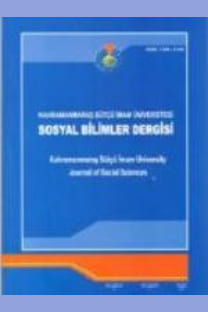Mültecilerin Ekonomik Büyüme Üzerine Etkisi: Seçili Göç Alan Ülkelere Dayalı Panel Veri Analizi
Uluslararası göç başta Türkiye olmak üzere tüm dünyayı ekonomik, sosyal, siyasal, kültürel ve toplumsal anlamda etkilemektedir. Son yıllarda artan savaşlar ve iç karışıklıklar nedeniyle özellikle artan zorunlu göç dalgaları toplumların ilişkilerini etkilemesi bakımından var olan bu küresel sorunun derinleşmesine neden olmuştur. Bireyden topluma ulus devletten uluslararası örgütlere kadar geniş bir alanı kapsayan göç konusu göç alan ülkelerde göçe ilişkin yeni politikaların belirlenmesi konusunda gelişmeleri hızlandırmış ve zorunlu hale getirmiştir. Bu bakımdan özellikle göç alan ülkelerin bu göç olgusunu kendi lehlerine çevirerek ekonomiye katkı sağlayacak şekilde durumu yönetmeleri büyük önem arz etmektedir. Bu çalışmada, 1996-2019 yılları arasında seçili göç alan 13 ülke için uluslararası göçün ekonomik büyüme üzerine etkisi dinamik panel veri yöntemiyle tahmin edilmiştir. Analizler sonucu elde edilen bulgular; panel genelinde uluslararası göçün ekonomik büyümeyi artırdığı yönündedir.
Anahtar Kelimeler:
Uluslararası Göç, Mülteci, Ekonomik Büyüme, Panel Veri Analizi
The Impact of Refugees on Economic Growth: Panel Data Analysis Based on Selected Receiving Countries
The international migration affected first and foremost Turkey and the whole World economically, socially, politically, culturally and societally. The increasing forced migration waves due to the increasing number of wars and domestic turbulences caused the global problems to deepen from the perspectives of national relations. The migration topic that covers a largeuk area from individual to the whole society, from countries to international organizations accelerated the formation of new policies and made them compulsory. Then, it becomes important for the migration receiving countries to turn the migration phenomenon in their favor by managing the situation for the country to benefit from it. In this study, the effect of international migration on the economic growth, for 13 migration receiving countries for the period of 1996-2019 was estimated by using the dynamic panel data analysis. The findings reveal that international migration increases economic growth.
Keywords:
International Migration, Refugee, Economic Growth, Panel Data Analysis,
___
- Altunç, Ö.F., & Uçan, O., (2017). Dış Göçlerin Türkiye Ekonomisinde İşsizlik Enflasyon ve Ekonomik Büyüme Üzerine Etkisi. Social Studies, 5(8), 197-212.
- Baltagı, B. H. (2008). Econometric Analysis of Panel Data. John Wiley & Sons.
- Boubtane, E., Coulibaly, D., & Rault, C. (2013). Immigration, Unemployment and GDP in The Host Country:
- Bootstrap Panel Granger Causality Analysis on OECD Countries. CES Working Papers.14, 1-30.
- Boubtane, E., Dumont, J. & Rault, C. (2016). Immigration and Economic Growth in the OECD Countries 1986-2006. Oxford Economic Papers, 68 (2), 340-360.
- Bove, V. & Elıa, L. (2016). Migration, Diversity, and Economic Growth. http://dx.doi.org/10.1016/j.worlddev.2016.08.012, 89, 227-239.
- Breusch, T. S. & Pagan, A. R. (1980). The Lagrange Multiplier Test And İts Applications to Model Specification in Econometrics. The Review of Economic Studies, 47(1), 239-253.
- Dolado, J., Gorıa, A., & Ichıno, A. (1994). Immıgratıon, Human Capial and Growth In The Host Country. Journal of Poupulatıon Economics, 193-215.
- Feridun, M. (2007). Immigratıon, Income and Unemployment: An Applicatıon of the Bounds Testing Approach To Cointegration, Project MUSE Scholarly Journals Online. Lough borough University, U.K, The Journal of Developing Areas, 41(1), 37-49.
- Foldvari, P.; Leeuwen, B., Ve Zanden, J. (2013). The Contribution of Migration to Economic Development in Holland 1570-1800. De Economist, 161(1), 1-18.
- Göv, A., & Dürrü, Z. (2017). Göç ve Ekonomik Büyüme İlişkisi: Seçilmiş OECD Ülkeleri Üzerine Bir Analiz, Ekonomik Araştırmalar Dergisi, 3(4), 491-502.
- Gür, N. (2017). Ülke Deneyimleri Işığında Uluslararası Göç Ekonomisi, Siyaset, Ekonomi ve Toplum Araştırmaları Vakfı, 224.
- Kang, Y., & Kim, B. Y. (2018). Immigration and Eonomic Growth: Do Origin and Destination Matter?, Applied Economics, 50(46), 4968-4984.
- Kartal, B., & Başcı, E. (2014). Türkiye’ye Yönelik Mülteci ve Sığınmacı Hareketleri, Sosyal Bilimler Dergisi, 12(2), 275-276. Maria, C., & Lazarova, E. A. (2012). Migration, Human Capital Formation, and Growth: An Empirical Investigation, World Development, 40(5), 938–955.
- Mccoskey, S. & Kao, C. (1998). A Residual-Based Test Of The Null Of Cointegration İn Panel Data. Econometric Reviews, 17(1), 57-84.
- Nazlıoglu, S. & Karul, C. (2017). Panel LM Unit Root Test With Gradual Structural Shifts, 40th International Panel Data Conference, July 7-8, 2017, Thessaloniki-Greece, ss. 1-26.
- Orefıce, G. (2010). Skilled Migration and Economic Performances: Evidence from OECD Countries. Swiss Society of Economics and Statistics, 146(4), 781-820.
- Pesaran, M. H. (2006). Estimation and Inference in Large Heterogeneous Panels with a Multifactor Error Structure, Econometrica, 74 (4), 967–1012.
- Pesaran, M.H., Ullah, A., & Yamagata, T. (2008). A Bias-adjusted LM Test of Error Cross-Section Independence, Econometrics Journal, 11, 105-127.
- Sevinç, H., Bozkurt, E., Künü, S. & Sevinç, D. (2016). Ekonomik Büyüme ve Göç İlişkisi: Gelişmekte Olan Ülkelere Dayalı Bir Analiz. International Conference On Eurasion Economies, 398-403.
- Unchr, The Un Refugee Egnecy, https://www.unhcr.org/refugee-statistics/download/?url=QdJRJ4 (15.11.2020).
- Walz, U. (1993). On the Growth (rate) Effects of Migration. Tübinge Diskussionsbeiträge Working Paper No. 24.
- Westerlund, J. (2006). Testing for Panel Cointegration with Multiple Structural Breaks. Oxford Bulletin of Economics and Statistics, 68, 101-132.
- World Bank. (2020). World Development Indicators, World Development Indicators, https://databank.worldbank.org/source/world-development-indicators (12.11.2020).
- Yerdelen, T. F. (2020). Panel Veri Ekonometrisi, Beta Yayınları.
- ISSN: 1304-8120
- Yayın Aralığı: Yılda 3 Sayı
- Başlangıç: 2004
- Yayıncı: Kahramanmaraş Sütçü İmam Universitesi
Sayıdaki Diğer Makaleler
Eski Uygurca Padak ve Türk Halk Edebiyatındaki Ayak Terimi Üzerine
Covid 19 Pandemi Sürecinde Online Satışlarda Algılanan Adaletin Tüketici Sinizmi Üzerine Etkisi
Eski Uygur Türkçesinde kolu Adı ve Türevleri
MARDİN / MİDYAT BÖLGESİNDEKİ EZİDİLERDE İBADET VE MÜZİK (SEMA MÜZİĞİ ÖRNEKLERİNİN ANALİZİ)
Seda YALMAN, Derya KARABURUN DOĞAN
Kültürel İktidar Ve Sinema: Vizontele Filmi Serisinde Kültürel İktidar Fragmanları
İlhami AYDIN, Zeynep Elif TUNÇ
I. Kılıçarslan’ın Haçlılarla İmtihanı
Mustafa TAŞLIYAN, Nur Esra BEKERECİ, Zeliha ÇAKIROĞLU
ATATÜRK-LORD LLOYD GÖRÜŞMESİ: TÜRK-İNGİLİZ İLİŞKİLERİ ve AKDENİZ SORUNU
Osmanlı Devlet’inde Milli İktisat Düşüncesi ve Türk Yurdu Dergisi
